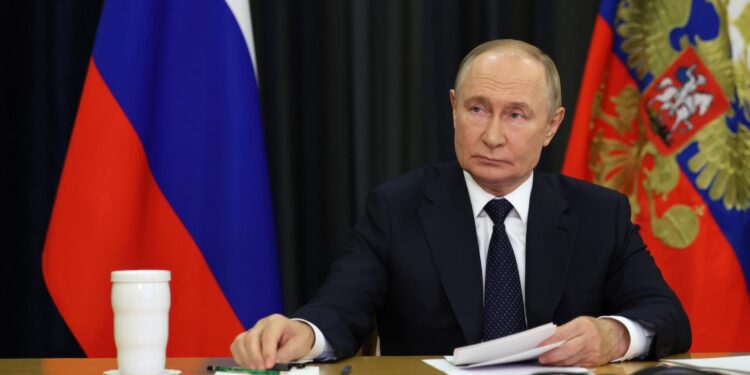In a significant development in international relations, Russian President Vladimir Putin has announced that Russia is prepared to adhere to the terms of the New START nuclear arms reduction treaty with the United States for an additional year beyond its scheduled expiration. This declaration, made during a recent address, signals a potential opening for diplomatic engagement amid heightened global tensions and ongoing conflicts. The New START treaty, which has been a cornerstone of strategic stability between the two nuclear superpowers since its inception, is set to expire in February 2026. Putin’s willingness to extend the framework for another year could be seen as a strategic move aimed at fostering dialogue and mitigating the risks of an arms race, even as both nations navigate a complex geopolitical landscape. The implications of this announcement could have far-reaching effects on global security and the future of nuclear arms control.
Putin’s Commitment to Nuclear Arms Deal: Implications for U.S.-Russia Relations
In a surprising statement, President Vladimir Putin has expressed Russia’s willingness to adhere to its nuclear arms commitments for an additional year beyond the formal expiry of the current treaty with the United States. This aligns with Russia’s aim to maintain strategic stability in an increasingly tense global atmosphere. Key considerations influencing this decision include:
- Escalating Geopolitical Tensions: With rising conflicts in Eastern Europe and heightened military posturing, both nations might find common ground in arms control to mitigate risks.
- Economic Factors: The financial impact of maintaining a robust nuclear arsenal may encourage both countries to pursue more sustainable approaches.
- International Pressure: Global calls for nuclear disarmament could further compel both nations to engage in dialogue and agreements.
The implications of this development extend beyond mere military strategy; they may signal a potential thawing of U.S.-Russia relations. Analysts suggest that a commitment to continue with the framework of nuclear arms limitations could pave the way for discussions on related issues such as cybersecurity, arms trade, and regional conflicts. A table summarizing the major nuclear agreements between the two countries illustrates this evolving landscape:
| Agreement | Year Established | Key Features |
|---|---|---|
| START I | 1991 | Limits on deployed nuclear warheads and delivery systems. |
| New START | 2010 | Reductions of strategic arms, with verification measures. |
| Extension of New START | 2021 | Five-year extension, allowing for continued dialogue. |
Analyzing the Potential Impact of a One-Year Extension on Global Nuclear Stability
In a significant shift in the geopolitical landscape, President Putin’s declaration that Russia is open to extending its nuclear arms deal with the United States for an additional year could potentially reshape global nuclear stability. This temporary extension offers a critical window for both nations to engage in dialogue about disarmament, limiting the risk of nuclear proliferation, and addressing concerns surrounding weapon capabilities. By fostering communication, this move may serve as a deterrent against escalating tensions and facilitate trust-building measures in an increasingly fragmented world order.
Furthermore, the implications of such an extension extend beyond U.S.-Russia relations. Key global players, including NATO allies and other nuclear-armed countries, will closely monitor this development. An effective one-year extension could help to establish a framework for future negotiations and lead to a broader consensus on nuclear arms control. Potential outcomes of this one-year period include:
- Increased Diplomatic Engagement: Encouraging discussions on limiting nuclear arsenals.
- Stabilizing Regional Conflicts: Reducing the likelihood of nuclear escalation in hotspot regions.
- Global Arms Control Regime: Restoring faith in multilateral agreements.
| Potential Outcomes | Implications |
|---|---|
| Improved Verification Measures | Enhances transparency and trust among nuclear nations. |
| Renewed Focus on Non-Proliferation | Strengthens efforts to prevent nuclear weapons spread. |
| Enhanced International Cooperation | Promotes collaboration on nuclear security initiatives. |
Recommendations for U.S. Policy: Navigating the Post-Expiration Landscape
The landscape of U.S. nuclear policy is poised for significant transformation as the current arms deal with Russia approaches expiration. With President Putin expressing a willingness to adhere to the agreement for an additional year, policymakers must cautiously navigate the implications of this temporary reprieve. It is crucial for U.S. leaders to seize this moment to prioritize diplomatic engagement with Russia, re-evaluating the objectives of the arms control framework and ensuring the continuation of dialogue. This can help to bolster transparency and build trust, ultimately laying a groundwork for more comprehensive agreements in the future.
In addition to diplomacy, the U.S. should focus on enhancing its strategic position by investing in modernization and verification measures of its nuclear arsenal. These steps can strengthen deterrence while affirming commitment to non-proliferation principles. New policies should also consider the following recommendations:
- Increase multilateral negotiations: Involve NATO allies and other nuclear powers to broaden the scope of arms control discussions.
- Develop robust verification frameworks: Ensure that all parties adhere to the terms and commitments of any extended agreement.
- Engage in public diplomacy: Foster awareness and understanding of nuclear issues among citizens to build support for arms control initiatives.
Insights and Conclusions
In conclusion, President Vladimir Putin’s recent declaration that Russia is prepared to adhere to the terms of the nuclear arms deal with the United States for one year after its expiration underscores a significant moment in international diplomacy. This gesture could open avenues for dialogue amidst escalating tensions between the two nations. As both countries navigate the complexities of arms control and global security, the focus will be on how this willingness to engage will influence the future landscape of nuclear non-proliferation efforts. Stakeholders on both sides are now left to ponder whether this commitment will lead to a constructive path forward or merely serve as a temporary reassurance in an increasingly fragmented geopolitical climate. The coming months will be critical in determining the viability of continued cooperation and the stability of global nuclear arsenals.














